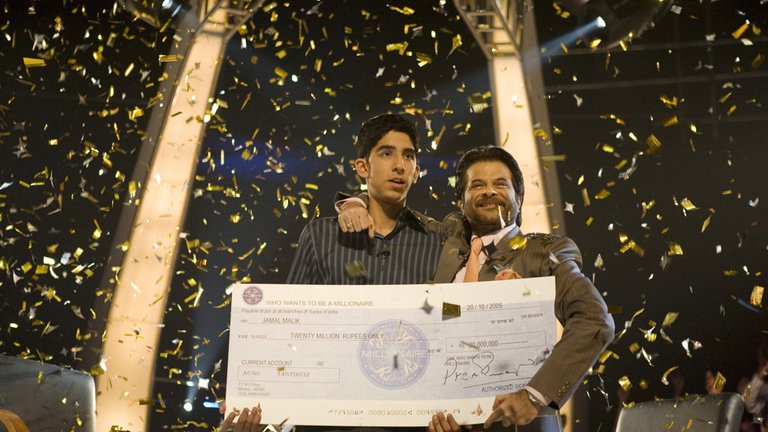Film Review: Slumdog Millionaire (2008)

Globalisation has become a defining feature of the contemporary world, often fuelled and exploited by Hollywood and Western cinema. While many films have celebrated this process, few have done so as prominently as Slumdog Millionaire, the 2008 Oscar-winning melodrama directed by Danny Boyle.
The film is adapted from the novel Q & A by Indian diplomat Vikram Swarup, which was inspired in part by a real-life scandal involving Charles Ingram, a British Army major, during his appearance on the quiz show Who Wants to Be a Millionaire?.
The protagonist, Jamal Malik, played by Dev Patel, is a young man who grew up in the utter poverty of Mumbai's slums. The plot begins as he participates in the Indian version of Who Wants to Be a Millionaire? and, despite his apparent lack of proper education, astounds everyone with correct answers to most obscure questions, winning record amounts of prizes. However, just as he is about to answer the final question with a correct answer yielding twenty million rupees, he is arrested and brought to a police station where the inspector (played by Irrfan Khan) tries to torture him into confessing that he cheated during the show. Despite this, Jamal maintains that he was able to answer correctly because each of the questions had an answer corresponding to a traumatic event from his life. Through flashbacks, the plot shows how Jamal, a Muslim, grew up in a slum before losing his mother in Hindu riots and, together with his brother, experiences all kinds of misadventures. His elder brother, Salim, grows up to become a powerful and ruthless figure in Mumbai's underworld (played by Madhur Mittal). The brothers befriend a street girl, Latika, who, as a grown woman (played by Freida Pinto), lives with a crime boss. Jamal has always been in love with Latika and participates in the quiz show in a desperate attempt to get noticed and reconnect with her.
Slumdog Millionaire is often regarded as one of Danny Boyle's most successful films, celebrated for its artistic merit and commercial appeal. Winning multiple Oscars, including Best Picture, it exemplifies how awards can sometimes reflect broader cultural narratives rather than purely artistic quality. The film's success can be attributed to its engaging storyline and vibrant cinematography, but it also raises questions about the nature of such accolades in an industry that frequently rewards films with socially relevant themes.
The film's setting plays a crucial role in its narrative impact. Although produced by a British team, it is firmly rooted in India, featuring Indian characters and predominantly Indian actors. This setting transcends mere exoticism; it celebrates India as an emerging power amidst stark contrasts between wealth and poverty. The film captures the essence of modern India—skyscrapers rise alongside slums, and young people embrace Western technology while grappling with deep-seated social issues. This duality is emblematic of India's rapid transformation into a global player.
The film was released at the best possible moment, with Oscar voters more than willing to show that their "politically correct" hearts were in the right place by embracing a film considered Indian, just as the world was embracing newly elected Barack Obama as its own, rather than merely an American president.
Boyle's directorial style is energetic and dynamic, reminiscent of his earlier work in Trainspotting. The film employs rapid cuts, Dutch angles, and an MTV-style aesthetic that appeals to contemporary viewers while paying homage to Bollywood's vibrant storytelling traditions.
Boyle's directing style, much like his arguably best film, Trainspotting, is quite energetic, based on rapid cuts, Dutch angles, and MTV-style cinematography, with plenty of homage to Bollywood.
The script by Simon Beaufoy, which simplified Swarup's source to fit the feature format, is often described as "Dickensian" by Western critics. It pays homage to old Hollywood's socially conscious melodramas and Bollywood films that tried to offer escapist entertainment to Indian masses. This results in a generally crowd-pleasing experience, but the film may not look as good to viewers with a more analytical mind or cynical mindset.
The acting in the film is very good, with Dev Patel, a British actor of Indian origin, delivering a solid performance. However, his role of a character that epitomizes goodness is not as impressive as that of Indian actor Anil Kapoor, who plays a hostile and manipulative quiz show host.
Following its Oscar triumph and rave reviews that preceded it, Slumdog Millionaire was destined to become a major box office hit and now represents the most commercially successful film in Boyle's filmography. One place that showed relatively little enthusiasm for Slumdog Millionaire was India, where its underwhelming box office success was explained by language barriers and audience unwillingness to accept characters speaking British English instead of Hindi. Some prominent Indian filmmakers and critics accused Boyle of cultural appropriation and portraying India in a bad light.
Regardless of what one might think of the authenticity of Slumdog Millionaire, Boyle ultimately admits that it is an escapist fantasy and signals this with a Bollywood-style ending featuring a spectacular song-and-dance number "Jai Ho," which won an Oscar for Best Original Song, just as its author A. R. Rahman won an Oscar for Best Original Soundtrack.
The world today may look less globalised and more messy, but perhaps there is a need for crowd-pleasing films like Slumdog Millionaire that help people briefly take a rest from such sad realities.
RATING: 7/10 (+++)
Blog in Croatian https://draxblog.com
Blog in English https://draxreview.wordpress.com/
InLeo blog https://inleo.io/@drax.leo
Hiveonboard: https://hiveonboard.com?ref=drax
Rising Star game: https://www.risingstargame.com?referrer=drax
1Inch: https://1inch.exchange/#/r/0x83823d8CCB74F828148258BB4457642124b1328e
BTC donations: 1EWxiMiP6iiG9rger3NuUSd6HByaxQWafG
ETH donations: 0xB305F144323b99e6f8b1d66f5D7DE78B498C32A7
BCH donations: qpvxw0jax79lhmvlgcldkzpqanf03r9cjv8y6gtmk9